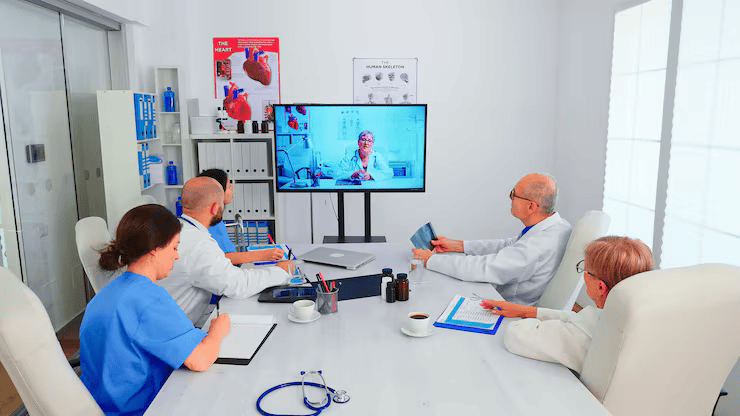Address
Sunday to Thursday: 8am – 4pm
Friday: Closed
Offering the best contact center services to optimise customer relations

Unified Communications (UC) is transforming the healthcare sector by streamlining how medical professionals communicate, collaborate, and deliver patient care. In hospitals, clinics, laboratories, and multi-specialty healthcare networks, effective communication can directly influence patient outcomes. However, traditional systems often create barriers—slow information flow, fragmented tools, limited mobility, and communication delays between departments. Unified Communications addresses these challenges by integrating voice, video, messaging, mobility, and collaboration tools into a single platform designed to improve both patient communication and staff coordination.
One of the greatest challenges in healthcare is maintaining smooth communication between patients and medical teams. Patients expect timely updates, appointment reminders, quick access to support staff, and the ability to connect with their doctors without unnecessary delays. Unified Communications makes this possible by enabling hospitals and clinics to centralize all communication channels. Features like automated call routing, secure messaging, appointment reminders, and video consultations help patients connect with the right department or doctor effortlessly. This reduces long waiting times, minimizes missed appointments, and makes the overall patient experience more organized and efficient.
UC also enhances the way healthcare staff communicate internally. In a typical healthcare environment, doctors, nurses, pharmacists, and administrative staff often use different communication tools or depend heavily on manual systems. This leads to delays in receiving critical information, which can affect treatment decisions. Unified Communications brings all medical personnel onto a single platform, allowing real-time communication through voice calls, instant messaging, or group collaboration tools. Doctors can instantly reach specialists for consultations, nurses can update patient status quickly, and administrative teams can broadcast updates across departments in seconds. This immediate access to information significantly improves coordination and reduces the chances of miscommunication.
Mobility is another major advantage of Unified Communications in healthcare. Medical professionals often move between wards, departments, or even different branch locations. With UC mobile apps and softphones, staff can stay connected on the move without being tied to a single desk phone or extension. They can access patient records, send urgent messages, or participate in video discussions regardless of where they are. This supports faster decision-making, especially in critical scenarios where time is essential.
Emergency response becomes more effective with UC systems. When urgent medical situations arise, teams need instant coordination. Unified Communications enables automated alerts, priority call routing, and seamless multi-person communication. Critical care teams can be notified instantly, doctors can collaborate through video, and key decisions can be taken without delays. This greatly enhances the speed and accuracy of emergency responses.
Additionally, Unified Communications improves operational efficiency by reducing communication-related errors and administrative burdens. Healthcare organizations often struggle with manual paperwork, fragmented appointment systems, and outdated PBX technology. With UC, features like automated scheduling, digital communication logs, integration with patient management systems, and centralized communication dashboards help minimize errors and streamline workflow. This allows staff to spend more time focusing on patient care rather than administrative tasks.
Security is a top concern in healthcare because patient data must always remain confidential. Unified Communications platforms are designed with strong security features such as encrypted voice and video, secure messaging, controlled user access, and compliance with healthcare communication standards. This ensures that sensitive patient information is protected while maintaining seamless communication across the organization.
Another major benefit is improved telemedicine capabilities. Unified Communications integrates high-quality video conferencing, secure patient communication portals, and remote access tools that allow healthcare providers to offer virtual consultations. This is particularly valuable for rural patients, follow-up appointments, mental health consultations, and chronic disease management. With UC-powered telemedicine, healthcare organizations can expand their reach and deliver care more conveniently.
In multi-branch healthcare networks, UC becomes a powerful tool for centralization. Administrators can manage communication across all branches from a single platform, ensure standardization, and enable seamless interaction between specialists in different locations. This promotes collaboration and enhances the overall quality of care.
Unified Communications is more than a technology upgrade—it is an essential component of modern healthcare delivery. By improving patient communication, enhancing staff coordination, increasing mobility, strengthening security, and enabling telemedicine, UC empowers healthcare organizations to operate more efficiently and deliver higher-quality care. As healthcare continues to evolve, Unified Communications will remain a crucial foundation for building a smarter, faster, and more connected healthcare system.
The cumulative necessity of unified communications has been improvised with FBS networking systems via top-quality brands in the world market. To heighten our client’s satisfaction, we have uncompromisingly allied with head brands such as MITEL Networks. FBS integrates assistance from MITEL, the leading benefactor of IP telephony systems. We aspire to connect the networks of commerce and marketing globally, forerunning to the advanced level of unified communication systems in each phase of your enterprise

In an era dominated by mobile devices, cloud computing, and advanced communication tools, some may assume traditional phone systems like PBX are obsolete.
Readmore
In today's digitally networked world, companies do business in a world that requires communication to be seamless.
Readmore
In today's busy business world, clear communication is important to ensuring productivity, customer satisfaction, and long-term achievement.
Readmore